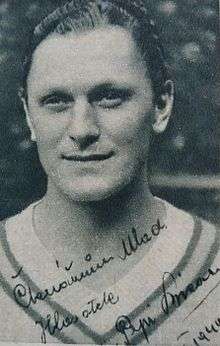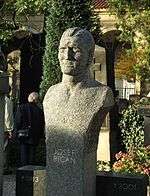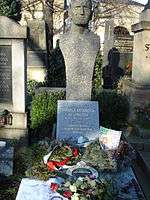Josef Bican
Josef "Pepi" Bican (25 September 1913 – 12 December 2001) was a Czech-Austrian professional footballer who played as a striker. He is the most prolific goalscorer of all time in league matches, first level championships matches, official matches and total matches (considering only players who mostly played at the highest level and taking into account goals scored in official matches played with national teams at all age levels and clubs in all divisions) according to Rec.Sport.Soccer Statistics Foundation (RSSSF).[1] RSSSF estimates that he scored more than 600 league goals, 537 first level championships goals, more than 805 goals in official matches and more than 1468 goals in total matches (data is missing regarding the 1952 Czech Second Division).[1] In 1998, the International Federation of Football History & Statistics (IFFHS) awarded him a 'Medal of Honour' for being among the world’s most successful top division goalscorers of all time.[2] In 2000, IFFHS awarded Bican the "Golden Ball" as the greatest goalscorer of the 20th Century.[3][4]
 | |||
| Personal information | |||
|---|---|---|---|
| Full name | Josef Bican | ||
| Date of birth | 25 September 1913 | ||
| Place of birth | Vienna, Austria-Hungary | ||
| Date of death | 12 December 2001 (aged 88) | ||
| Place of death | Prague, Czech Republic | ||
| Playing position(s) | Striker | ||
| Youth career | |||
| 1925–1927 | Hertha Vienna II | ||
| 1927–1928 | Schustek | ||
| Senior career* | |||
| Years | Team | Apps | (Gls) |
| 1928–1930 | Schustek | 23 | (24) |
| 1930–1931 | Farbenlutz | 20 | (47) |
| 1931–1935 | Rapid Vienna | 49 | (52) |
| 1935–1937 | Admira | 26 | (18) |
| 1937–1948 | Slavia Prague | 217 | (395) |
| 1950–1951 | FC Vítkovice | 33 | (30) |
| 1952 | FC Hradec Králové | 9 | (19) |
| 1953–1955 | Dynamo Prague | 29 | (22) |
| Total | 406 | (607) | |
| National team | |||
| 1933–1936 | Austria | 19 | (14) |
| 1938–1949 | Czechoslovakia | 14 | (12) |
| 1939 | Bohemia and Moravia | 1 | (3) |
| Teams managed | |||
| 1954–1956 | Slavia Prague | ||
| 1956–1959 | TJ Slovan Liberec | ||
| 1959–1960 | TJ Spartak ZJS Brno | ||
| 1963–1964 | TJ Baník Příbram | ||
| 1964 | FC Hradec Králové | ||
| 1967–1969 | SONP Kladno | ||
| 1969–1972 | KSK Tongeren | ||
| 1977 | Benešov | ||
| * Senior club appearances and goals counted for the domestic league only | |||
Bican is Slavia Praha's all-time top goalscorer with 556 goals in 303 official matches,[1] and also holds the record for being the all-time top goalscorer in the Czechoslovak First League with 447 goals[5] in 279 matches. Bican was a member of the Austrian Wunderteam of the 1930s and was the season's highest scorer in the whole of Europe on five separate occasions. He had the ability to play with both feet,[6] had considerable pace and was able to run 100 metres in 10.8 seconds, which was as fast as many sprinters of the time.
Early life
Bican was born in Vienna to František and Ludmila Bican. He was the second of three children.[7] František was from Sedlice in Southern Bohemia, and Ludmila was Viennese Czech. Josef's father František was a footballer who played for Hertha Vienna. He fought in World War I and returned uninjured. However, František was to die at the age of just 30 during 1921 because he refused an operation to treat a kidney injury sustained in a football match. His mother worked in a restaurant kitchen. The family's poverty meant that Bican had to play football without shoes, which helped him improve his ball control skills. Bican attended the Jan Amos Komenský school, a Czech school in Vienna. Four years after his father's death in 1925, twelve-year-old Bican started to play for the Hertha Vienna junior team, Hertha Vienna II. When he was 18, Bican was spotted by Rapid Vienna, who were a big club in the city at the time.
Club career
When Bican first joined Rapid, he received 150 schillings, but, by the age of 20, Rapid wanted to keep him so much that they paid him 600 schillings.
During 1937, Bican left Vienna to join Czech club Slavia Prague.[7] He played for Slavia throughout World War II, while many of his football rivals were at war. During eight league seasons he would score 328 goals, including 57[8] in 26 matches one particular season. Three times in his career, Bican scored seven goals in a game.[9] In a 1939–40 league match against Zlín, Bican found the net seven times as Slavia ran out 10–1 winners.[9] During the 1940–41 season, Bican matched his feat of the previous season, again against Zlín, scoring seven times, as Slavia won by a 12–1 scoreline.[9] It was 1947–48 before Bican managed his third seven-goal match, as Slavia defeated České Budějovice in a game which finished 15–1.[9]
He was, in the leagues that he played, the top-scorer 12 times during his 27-year career and Europe's top scorer in five consecutive seasons, from 1939–40 to 1943–44 while the most of players and the physically fit young men were in the war.
In the devastated Europe after the war, several of Europe's biggest clubs should have wanted Bican. Juventus offered him handsome terms to join them, but he refused, supposedly after he was advised that Communists might control Italy. He stayed in Prague, but the Communists came to power there during 1948. Bican refused to join the Communist Party, just as he had refused to join the Nazi Party in Austria.
Bican tried to improve his standing with the Communists[6] by joining steel works Železárny Vítkovice. During 1951, he joined FC Hradec Králové, but, on 1 May 1953, the Communist Party forced him to leave the city and, therefore, the club. After being forced to leave, he returned to Slavia Prague, or, as it was known then, Dynamo Prague. He finally retired from playing, still at Slavia, at the age of 42 during 1955. He was the oldest player in the league at that time.
International career
On 29 November 1933, aged 20 years and 64 days, Bican made his debut for Austria in a 2–2 draw against Scotland. He later played for them at the 1934 World Cup, when the Austrian Wunderteam reached the semifinals. His solitary goal in the tournament came in extra-time in the Austrians' 3–2 win over France.
At the time Bican was playing for Slavia Prague, he applied for Czechoslovak citizenship. However, when he eventually became a Czechoslovak citizen, he discovered that a clerical error meant he couldn't play at the World Cup during 1938. In total, he scored 34 goals in 45 international matches for 3 teams (Austria, Czechoslovakia and Bohemia & Moravia). His final national team appearance was for Czechoslovakia in a 3–1 defeat against Bulgaria on 4 September 1949.[10]
However, his success did have a disadvantage. Other members of the team became jealous of the tall, handsome Bican's success, and he was sometimes called abusive names, such as "Austrian bastard".[11]
International goals
Goals for Austria
Austria's goal tally first[12]
| # | Date | Venue | Opponent | Score | Result | Competition |
|---|---|---|---|---|---|---|
| 1. | 10 December 1933 | Olympic Stadium, Amsterdam, Netherlands | 1–0 | 1–0 | Friendly | |
| 2. | 11 February 1934 | Charmilles Stadium, Geneva, Switzerland | 1–0 | 3–2 | 1933–35 Dr. Gero Cup | |
| 3. | 3–2 | |||||
| 4. | 15 April 1934 | Hohe Warte Stadium, Vienna, Austria | 4–2 | 5–2 | Friendly | |
| 5. | 5–2 | |||||
| 6. | 27 May 1934 | Stadio Benito Mussolini, Turin, Italy | 3–1 | 3–2 | 1934 FIFA World Cup | |
| 7. | 6 October 1935 | Praterstadion, Vienna, Austria | 1–1 | 4–4 | 1933-1935 Dr.Gero Cup | |
| 8. | 2–2 | |||||
| 9. | 3–4 | |||||
| 10. | 19 January 1936 | Estadio Metropolitano de Madrid, Madrid, Spain | 1–0 | 5–4 | Friendly | |
| 11. | 26 January 1936 | Campo da Constituição, Porto, Portugal | 3–1 | 3–2 | Friendly | |
| 12. | 22 March 1936 | Praterstadion, Vienna, Austria | 1–1 | 1–1 | 1936–37 Dr. Gero Cup | |
| 13. | 5 April 1936 | Praterstadion, Vienna, Austria | 1–1 | 3–5 | Friendly | |
| 14. | 2–3 | |||||
Goals for Czechoslovakia
Czechoslovakia's goal tally first[10][12]
| # | Date | Venue | Opponent | Score | Result | Competition |
|---|---|---|---|---|---|---|
| 1. | 7 August 1938 | Råsunda Stadium, Stockholm, Sweden | 2–0 | 6–2 | Friendly | |
| 2. | 3–0 | |||||
| 3. | 5–2 | |||||
| 4. | 28 August 1938 | Stadion Concordije, Zagreb, Kingdom of Yugoslavia | 2–0 | 3–1 | ||
| 5. | 4 December 1938 | AC Sparta Stadion, Praha, Czechoslovakia | 1–2 | 6–2 | ||
| 6. | 3–2 | |||||
| 7. | 4–2 | |||||
| 8. | 6–2 | |||||
| 9. | 11 May 1947 | 1–0 | 3–1 | |||
| 10. | 3–1 | |||||
| 11. | 31 August 1947 | 1–0 | 6–3 | |||
| 12. | 2–0 |
Goals for Bohemia and Moravia
Bohemia and Moravia's goal tally first[10][12]
| # | Date | Venue | Opponent | Score | Result | Competition |
|---|---|---|---|---|---|---|
| 1. | 12 November 1939 | Hermann Göring Stadium, Wroclaw, Nazi Germany | 1–0 | 4–4 | Friendly | |
| 2. | 3–0 | |||||
| 3. | 4–2 |
Life after retirement


During the spring of 1968, Bican was told that he would be allowed to have a coaching job abroad. He impressed the Belgian team Tongeren and they hired him as a coach, where he had some success taking them from Division 4 to Division 2.
Around this time, Pelé was getting ready for his 1000th goal and many journalists were searching for another player who had scored a thousand goals. Former Austrian player Franz "Bimbo" Binder suggested Bican, who he claimed had scored 5000 goals.[11] When reporters asked Bican why he hadn't made more of a fuss about his goalscoring feats, he simply said, "who'd have believed me if I said I'd scored five times as many goals as Pelé?" However, to score this 5000 goals he should have kept an average of 185 goals/year along all his 27 years of career, but only counting goals in official matches, Bican scored at least 805.[1] Bican's goal-scoring feats are often forgotten because he did not make a big fuss about it in the media. His record is often overshadowed by Pele's 1283 goal record. But shortly before his death in 2001, IFFHS based on RSSSF statistics declared Bican with 643 league goals, the most prolific scorer of the 20th Century.[13][14] This was judged by the number of times a player had been top scorer in his domestic league. Bican managed this feat 12 times, more than any other player in football history.[3]
In the 1990s, the retired footballer spoke to Czech TV: “When I talk to young reporters, they always say, ‘Mr Bican, scoring was easier back in your day.’ But I ask them, ‘How come? Look, are there opportunities today?’ And they tell me, ‘Of course there are, many of them’. And I say, ‘There you go. If there weren’t opportunities, it would be difficult. But if there are, scoring is the same as it was a hundred years ago, and will be the same in a hundred years’ time, too. It will always be the same.” [14]
Josef "Pepi" Bican spent the last few months of his life in hospital with heart problems. He had hoped to be home for Christmas, but died less than 2 weeks before that, at the age of 88.
See also
- List of men's footballers with 500 or more goals
References
- Kolos, Vladimir (21 January 2016). "Prolific Scorers Data". Rec.Sport.Soccer Statistics Foundation (RSSSF). Retrieved 3 July 2020.
- Admin, IFFHS (12 November 2017). "TOP DIVISION GOAL SCORERS OF ALL TIME : FERENC PUSKAS LEADS THE RANKING". International Federation of Football History & Statistics (IFFHS). Retrieved 3 July 2020.
- "Josef Bican". Retrieved 4 August 2020.
- "Josef Bican : world's greatest goalscorer". Retrieved 4 August 2020.
- Slavia Top Scorers of All Times SK Slavia Praha
- "Josef Pepi Bican – The Lonely Man at the Top". Goalden Times. 6 June 2017. Retrieved 16 May 2019.
- Nováček, Ondřej (25 September 2008). "Legendární fotbalový kanonýr Bican by se dožil pětadevadesáti let". Česká televize (in Czech). Retrieved 8 May 2012.
- http://arfts.com/player.php?id=4&season=12
- Jeřábek, Luboš; Palička, Jan (7 October 2007). "Brazilcovo šílenství: sedm gólů za zápas". idnes.cz (in Czech). Retrieved 22 April 2012.
- Josef Bican at FAČR (in Czech)
- Willoughby, Ian (23 January 2002). "Czechs in History: Josef "Pepi" Bican". Czech Radio. Retrieved 8 May 2012.
- Josef Bican - International Goals. RSSSF
- "Josef Bican". Retrieved 4 August 2020.
- "Legendary footballer Pepi Bican inducted in Czech FA's Hall of Fame". Retrieved 9 August 2020.